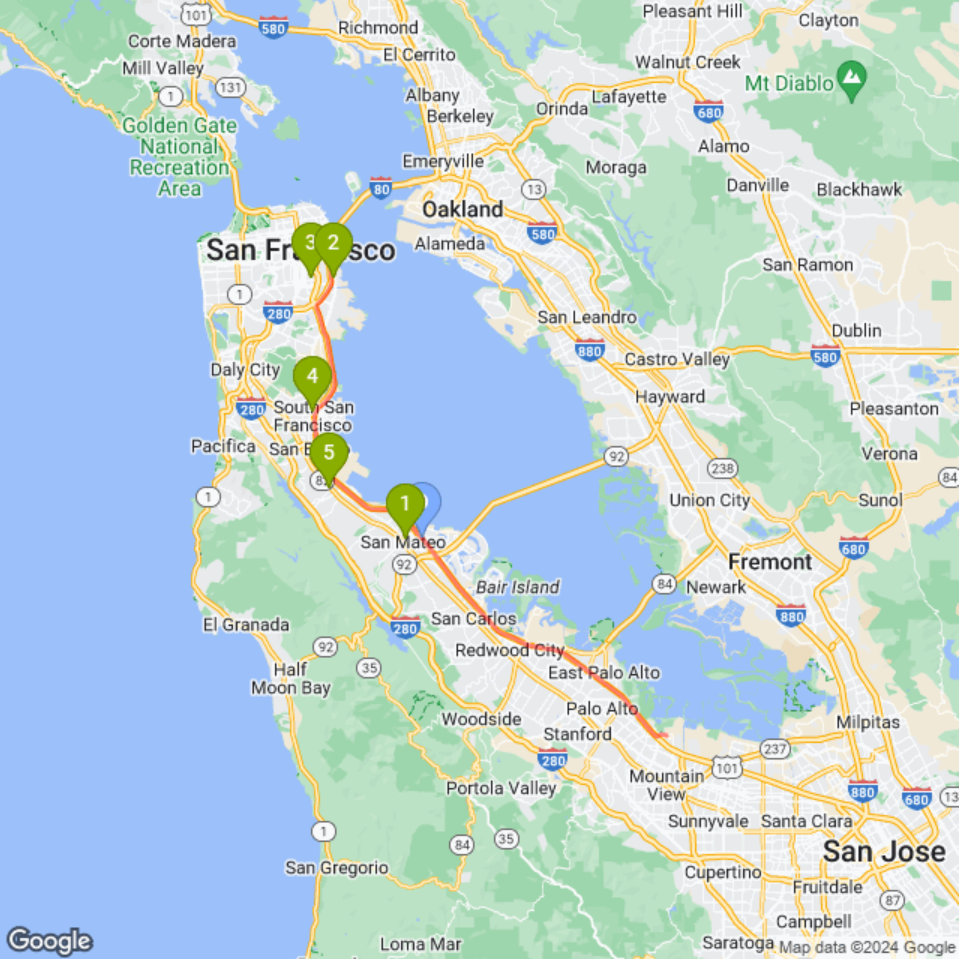Combine routing summaries with search along route
You can combine routing summary calculations with search along a route. In this case, Text Search (New) returns the travel duration and distance to each place in the response, and then from each place to the final destination of the route.
To use Text Search (New) to calculate the routing summary along with search along a route:
-
Use the Routes API to calculate a route that returns a route polyline in the response.
-
Use
searchAlongRouteParameters.setPolyline()to pass the route polyline to Text Search (New) to bias the search results to the route. The response then contains places that match the search criteria and are also located near the specified route. -
When building the request object, add
.setRoutingSummariesIncluded(true).
By default, Text Search (New) performs the search along the entire route:
// Define the route polyline object using the route string. EncodedPolyline encodedPolyline = EncodedPolyline.newInstance("wblcFptchVIFOd@G@EVw@Ms@dHKR}ApNA`AF~@Hf@TjAb@bBb@~@n@p@^Rd@~@Vz@HVz@nDLt@?d@Kr@c@~@mD`G?`@aEfGkCnDuChDm`@bb@[`@{GhHeEdEciBnnBkC`DkC~DaClEuKjT_Z|l@Qb@iR~_@}EzJ_AdB_Und@kAfCaOjZkg@vcAqBzD_]rr@iBlEaBxEgArD}AlG}AhHsA`IeAnH{@dIq@dJgL~iBq@rHu@vGgAtHwArHaBhHkBzG_DpJ}Nbc@iBhGkA|EgC|LcIjb@oAhG_AvDgAdDkApC_BzCiBpCsFvGii@vn@scAxlAmLjNgSzUeRjT{TzWqExEmG|FuNlMmMhLaRvPqOlNmbAl}@mFlF{PlOmJfIoElE}LtMiSbU_H`I}}@jcAwl@vp@oAbBqA~BeAhCm@tBg@fCWrBQ~BI|DaB~rBO~D[bEa@`Dm@pDaAdE{@vC_BbEkB~Def@|z@sEzHKJeS~]}K`S{\\~l@cXpe@sBpDm@bAuCxDkBrBiC~BwCtByBnAcBx@}Bt@{Bn@gh@|LaOpDeFhAoDj@aE^kVrA_E^iEr@yD~@uBr@gMjF_EnAcCh@eFr@_DRsAD}@Jsu@xCWDqIV}BCeCOyDm@cBa@_DmA}JeE_CwAsBcBiBoBuAqBmOoX{CuEkB_CoDqDkVoUoD{CeE_DkEkC_FeCqB}@sDuAoDgAeCe@cCW}CK}BDaDTeOlBcuBrYaNlBq@Dyd@rGyFt@yBb@eBf@oCnAoBlAkIpGkAp@wBbAaCt@oFdAwKjBoGxA{FbByIjC_HfB_@KmNdDuC|@uFzBcH|C{@\\[?sBv@}@VaBVoA@y@EmAQcA[w@]aBkAeAkA}BuDUKs@uAqBsCwBcCgAiAiN_MyKsJsG{GkBaBiBuA{BwAwDkBcOaHiC_AiCg@}BQcCAcBHqBVkB`@qEjAu@LgCVgAHwG@sG?mABsH^eNr@mBXy@NqBt@uAt@aBlAkAlA}BtCyApBiAdB_BxB{A`B}@j@oAf@s@PeCVcIf@gAAkAQy@YiAo@_A{@_DgEgJqM_DeEaM}PoBiCzAsBw@kAdAGVk@f@q@z@C "); // Specify the list of fields to return. final List<Place.Field> placeFields = Arrays.asList(Place.Field.ID, Place.Field.NAME); // Define the search along route parameters object and pass the polyline object. SearchAlongRouteParameters searchAlongRouteParameters = SearchAlongRouteParameters.builder() .setPolyline(encodedPolyline) .build(); // Use the builder to create a SearchByTextRequest object and pass the search along route parameters. final SearchByTextRequest searchByTextRequest = SearchByTextRequest.builder("Spicy Vegetarian Food", placeFields) .setMaxResultCount(10) .setSearchAlongRouteParameters(searchAlongRouteParameters) .setRoutingSummariesIncluded(true) .build(); // Call PlacesClient.searchByText() to perform the search. // Define a response handler to process the returned List of Place objects. placesClient.searchByText(searchByTextRequest) .addOnSuccessListener(response -> { List<Place> places = response.getPlaces(); List<RoutingSummary> routingSummaries = response.getRoutingSummaries(); List<Leg> legs = routingSummaries.get(0).getLegs(); Duration duration = legs.get(0).getDuration(); });
The response contains objects that include lists of the requested places fields and routing
summaries containing the duration and distance to travel to each place.
You can call SearchByTextResponse.getRoutingSummaries() to return the list of routing summaries.
For each entry in the legs array, Text Search (New) returns a two-leg trip
time:
-
The first leg contains the travel duration and distance from the origin to the place.
-
The second leg contains the travel duration and distance from the place to the route destination.
Specify the routing origin, travel mode, and route modifiers
You can modify the search and routing summary calculation by specifying the routing origin, travel mode, route modifiers, and routing preferences. The travel mode and route modifiers work the same as for calculating routing summaries without specifying a route as shown in the Specify travel options topic.
By default, the first leg of each result contains the distance from the origin defined by the polyline to each place. However, you can override that default by explicitly specifying a routing origin in the request. If specified, the first leg of all responses specifies the distances and duration from the specified routing origin, overriding the origin from the polyline.
In the next example, you specify a routing origin as the coordinates of San Mateo, CA, specify to avoid tolls, and set the number of results to 5:
// Define the route polyline object using the route string. EncodedPolyline encodedPolyline = EncodedPolyline.newInstance("wblcFptchVIFOd@G@EVw@Ms@dHKR}ApNA`AF~@Hf@TjAb@bBb@~@n@p@^Rd@~@Vz@HVz@nDLt@?d@Kr@c@~@mD`G?`@aEfGkCnDuChDm`@bb@[`@{GhHeEdEciBnnBkC`DkC~DaClEuKjT_Z|l@Qb@iR~_@}EzJ_AdB_Und@kAfCaOjZkg@vcAqBzD_]rr@iBlEaBxEgArD}AlG}AhHsA`IeAnH{@dIq@dJgL~iBq@rHu@vGgAtHwArHaBhHkBzG_DpJ}Nbc@iBhGkA|EgC|LcIjb@oAhG_AvDgAdDkApC_BzCiBpCsFvGii@vn@scAxlAmLjNgSzUeRjT{TzWqExEmG|FuNlMmMhLaRvPqOlNmbAl}@mFlF{PlOmJfIoElE}LtMiSbU_H`I}}@jcAwl@vp@oAbBqA~BeAhCm@tBg@fCWrBQ~BI|DaB~rBO~D[bEa@`Dm@pDaAdE{@vC_BbEkB~Def@|z@sEzHKJeS~]}K`S{\\~l@cXpe@sBpDm@bAuCxDkBrBiC~BwCtByBnAcBx@}Bt@{Bn@gh@|LaOpDeFhAoDj@aE^kVrA_E^iEr@yD~@uBr@gMjF_EnAcCh@eFr@_DRsAD}@Jsu@xCWDqIV}BCeCOyDm@cBa@_DmA}JeE_CwAsBcBiBoBuAqBmOoX{CuEkB_CoDqDkVoUoD{CeE_DkEkC_FeCqB}@sDuAoDgAeCe@cCW}CK}BDaDTeOlBcuBrYaNlBq@Dyd@rGyFt@yBb@eBf@oCnAoBlAkIpGkAp@wBbAaCt@oFdAwKjBoGxA{FbByIjC_HfB_@KmNdDuC|@uFzBcH|C{@\\[?sBv@}@VaBVoA@y@EmAQcA[w@]aBkAeAkA}BuDUKs@uAqBsCwBcCgAiAiN_MyKsJsG{GkBaBiBuA{BwAwDkBcOaHiC_AiCg@}BQcCAcBHqBVkB`@qEjAu@LgCVgAHwG@sG?mABsH^eNr@mBXy@NqBt@uAt@aBlAkAlA}BtCyApBiAdB_BxB{A`B}@j@oAf@s@PeCVcIf@gAAkAQy@YiAo@_A{@_DgEgJqM_DeEaM}PoBiCzAsBw@kAdAGVk@f@q@z@C "); // Specify the list of fields to return. final List<Place.Field> placeFields = Arrays.asList(Place.Field.ID, Place.Field.NAME); // Define the routing modifiers object. RouteModifiers routeModifiers = RouteModifiers.builder() .setAvoidTolls(true) .build(); // Define the routing parameters object and pass the routing origin. // Set the travel mode to DRIVE. // Pass the routeModifiers object. RoutingParameters routingParameters = RoutingParameters.builder() .setOrigin(toLatLng("37.56617, -122.30870")) .setTravelMode(DRIVE) .setRouteModifiers(routeModifiers) .build(); // Define the search along route parameters object and pass the polyline object. SearchAlongRouteParameters searchAlongRouteParameters = SearchAlongRouteParameters.builder() .setPolyline(encodedPolyline) .build(); // Use the builder to create a SearchByTextRequest object and pass the search along route parameters. final SearchByTextRequest searchByTextRequest = SearchByTextRequest.builder("Spicy Vegetarian Food", placeFields) .setMaxResultCount(5) .setRoutingParameters(routingParameters) .setSearchAlongRouteParameters(searchAlongRouteParameters) .setRoutingSummariesIncluded(true) .build(); // Call PlacesClient.searchByText() to perform the search. // Define a response handler to process the returned List of Place objects. placesClient.searchByText(searchByTextRequest) .addOnSuccessListener(response -> { List<Place> places = response.getPlaces(); List<RoutingSummary> routingSummaries = result.getRoutingSummaries(); List<Leg> legs = routingSummaries.get(0).getLegs(); Duration duration = legs.get(0).getDuration(); });
The following image shows a map that contains the route polyline, the new origin (light-blue pin), and the places in the search results (green pins). Notice how all the results are along the route but past San Mateo:

